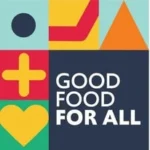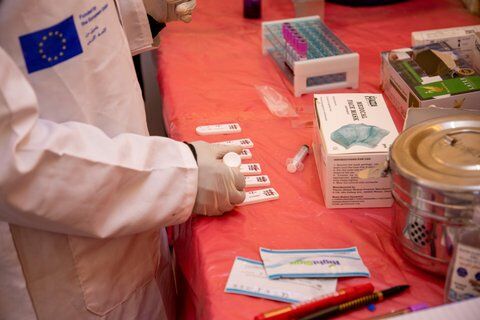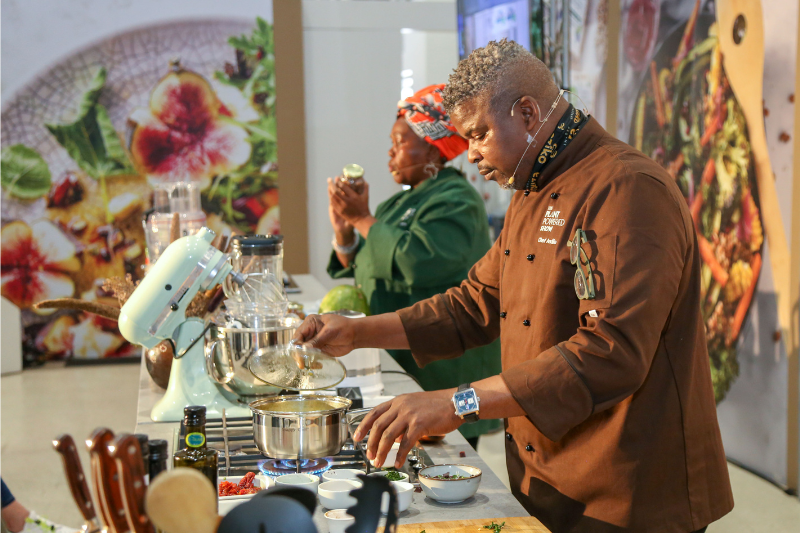
Good Life Show Africa
Cape Town 30 May – June 1 2025 | Johannesburg 1 – 3 August 2025
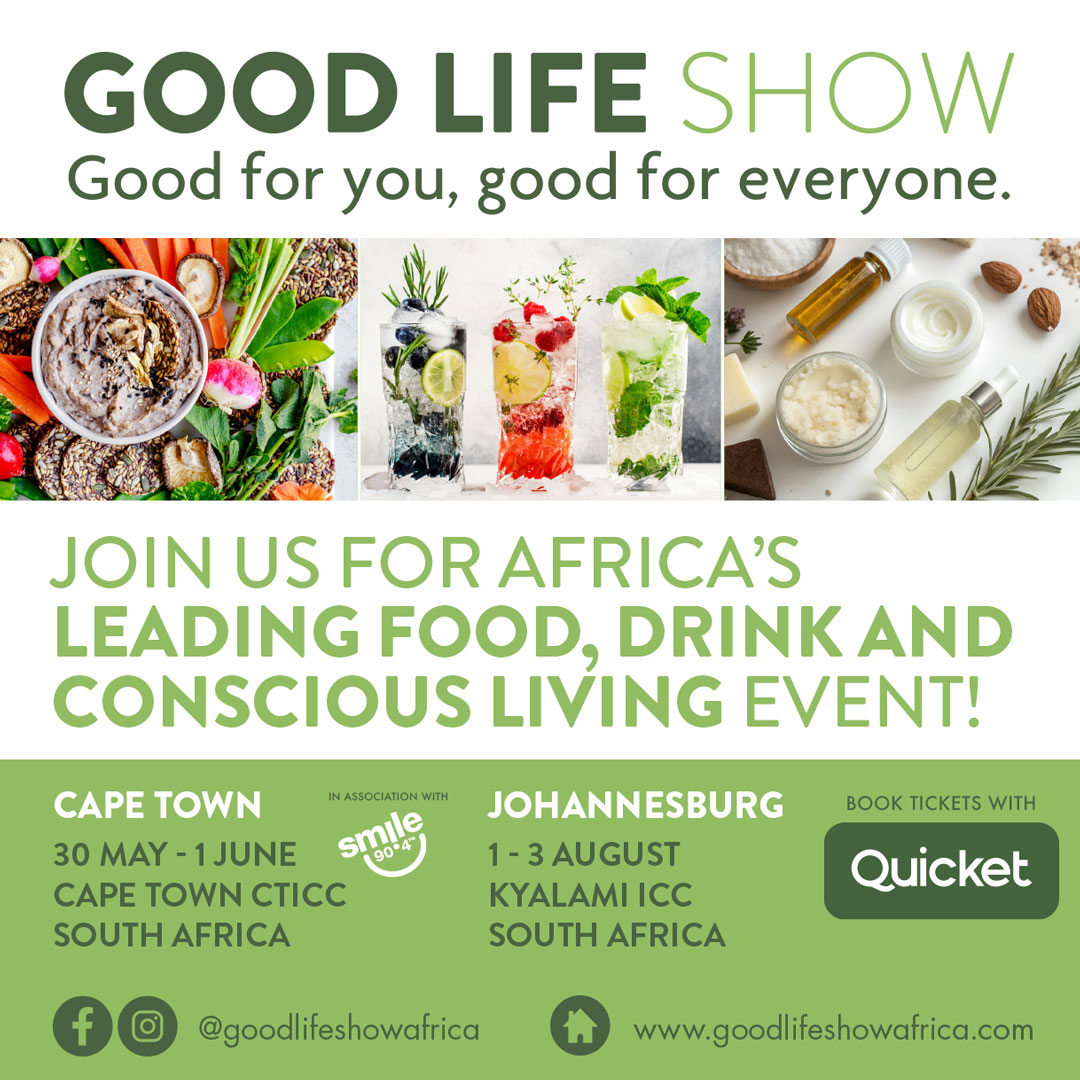
Meet Bettina Campolucci Bordi at The Good Life Show!
Learn more about The Good Life Show here
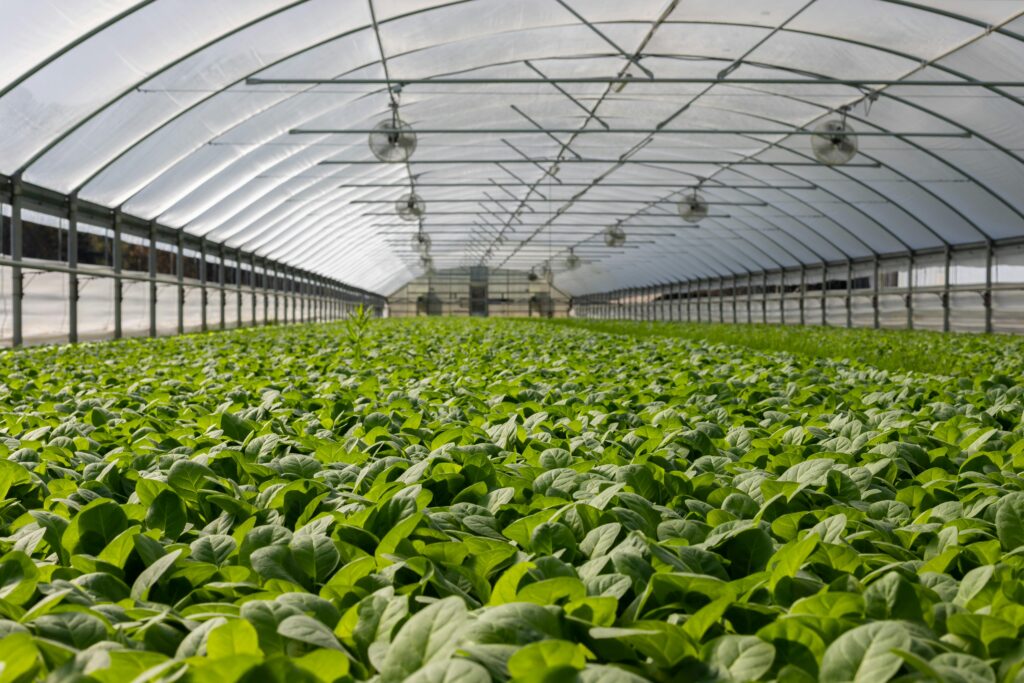
CGIAR Science Week
Innovation and partnerships for a food, nutrition, and climate secure-future
When humanity faced its greatest challenges, science and innovation provided solutions. Today, major global challenges such as climate change, gender and social inequalities, poor-quality diets, rural poverty, environmental degradation, and other issues stemming from fragility, conflict, and violence, threaten the sustainability of food, land, and water systems, leaving the most vulnerable people and communities at greatest risk.
Recognizing the urgency of these challenges, CGIAR and the Kenyan Agricultural and Livestock Research Organization (KALRO) are bringing together the world’s leading scientists and decision-makers in agriculture, climate, and health for the very first CGIAR Science Week. This inaugural event will create a unique platform for experts to collaborate and share insights across these fields, a critical effort at a time when the new CGIAR research Portfolio is being shaped to address the biggest challenges and opportunities of our time. This gathering will be a key moment to advance research and innovation, inspire action, and establish critical partnerships that can secure investment in sustainable food systems to nourish both people and the planet.
Drawing on CGIAR science and partnerships from around the world, the inaugural CGIAR Science Week will engage the community of global leaders in research, policy, and development working for a food, nutrition, and climate secure future in active dialogue during plenary sessions focused on harnessing and scaling science and innovation. Participants will learn about GIAR’s new 2025–2030 science research portfolio through dedicated Parallel Sessions on Science Programs & Accelerators, and discover cutting-edge science from CGIAR centers worldwide through Science Talks, Innovation Showcases, and Research Workshops. The event also offers the chance to see, first-hand, transformative innovations improving the lives of vulnerable communities in our Exhibition Area and to explore CGIAR and partner labs and research stations during Field Visits to see science in action.
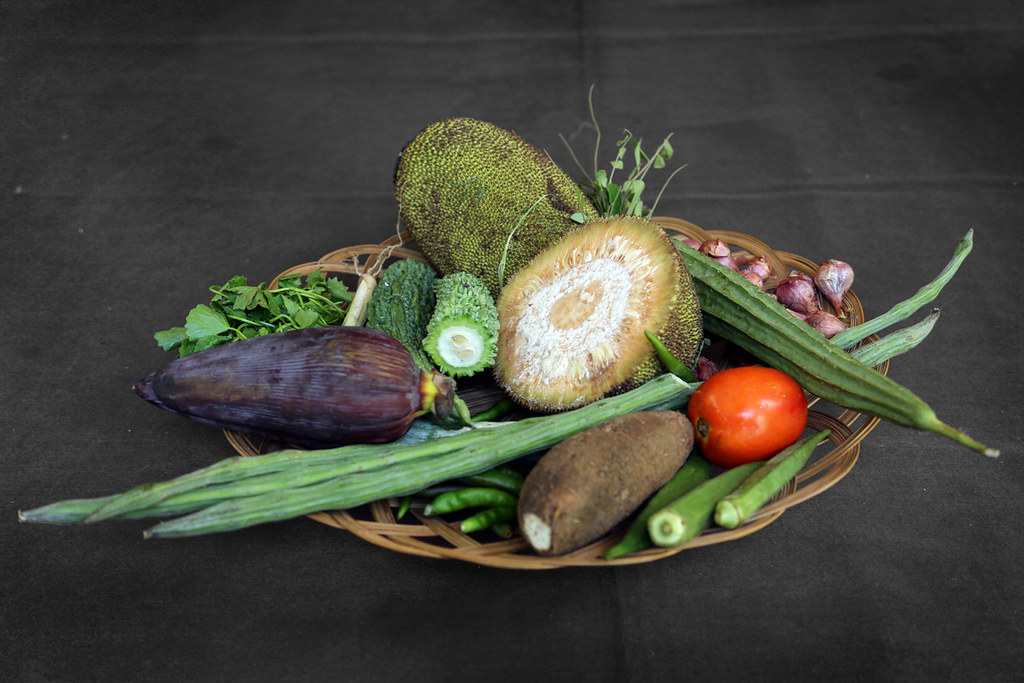
City St George’s Food Policy Symposium
Professional cookery – the missing ingredient for food systems transformation
Our current food systems are heavily commodified and cause many problems including environmental degradation, household food insecurity, diet-related illnesses, inequalities and excessive food waste. The food sector in the UK employs more than 13% of the country’s workforce, illustrating our reliance on an army of workers from farmers and fishermen through to food technicians and chefs to keep us nourished. Yet the sector is facing record staff shortages, leaving our food systems even more vulnerable to unexpected shocks and long-term problems.
Professional cooks or chefs are vital food systems actors, responsible for feeding people across schools, hospitals, care homes and prisons, and in restaurants, cafes and takeaways. They also manufacture and design our everyday foods. But professional cooks are undervalued and have been overlooked by policymakers and others as key players in food systems transformation.
There is a distinct lack of clarity in the variety of career pathways for professional cooks across public food service and food manufacturing as well as hospitality. Cookery careers receive a low profile in school curriculums and by careers advisers further hindering future workforce capacity. Current professional cookery curriculum requirements cover the essential topics of food safety and hygiene, menu planning and managerial skills. But they are also well placed to incorporate food systems subject areas such as nutrition, environmental sustainability, supply chain disruptions, and food waste. Leveraging this opportunity could broaden the skills of a significant number of actors in our everyday settings to address systemic food system problems, increase capabilities to manage food supply shocks by being agile with ingredients and reorientate our society to value freshly cooked, healthy, sustainable meals and snacks.
The 2025 City St George’s Food Policy Symposium will invite collective debate on this novel food systems topic and explore how professional cookery can be prioritised and reimagined through food policy. We will identify the practical needs and policy opportunities for a food systems approach to professional cookery and consider terminology. Discussions and workshops will reflect on how professional cookery pathways can be integrated with existing and future food policies to meaningfully contribute to a culture which values professional cooks as respected societal roles alongside farmers, doctors, nurses and teachers.
During this event we will:
- Examine the existing patchwork of professional cookery pathways in the UK
- Identify opportunities for policymakers to streamline professional cookery pathways and integrate food systems-based curriculum which moves beyond food safety and food preparation
- Understand the public and private sector needs and opportunities for food systems-based professional cookery, including leveraging the apprenticeship levy and incoming local procurement policy
- Share best practice examples of food systems-based professional cookery approaches and courses from within and beyond the UK
- Harness the momentum for the knowledge and skills of professional cookery to be valued in our society and reimagined to prioritise human and planetary health and foster local and regional economic benefits
The City St George’s Food Policy Symposium is hosted by the Centre for Food Policy and is generously supported by the Worshipful Company of Cooks.
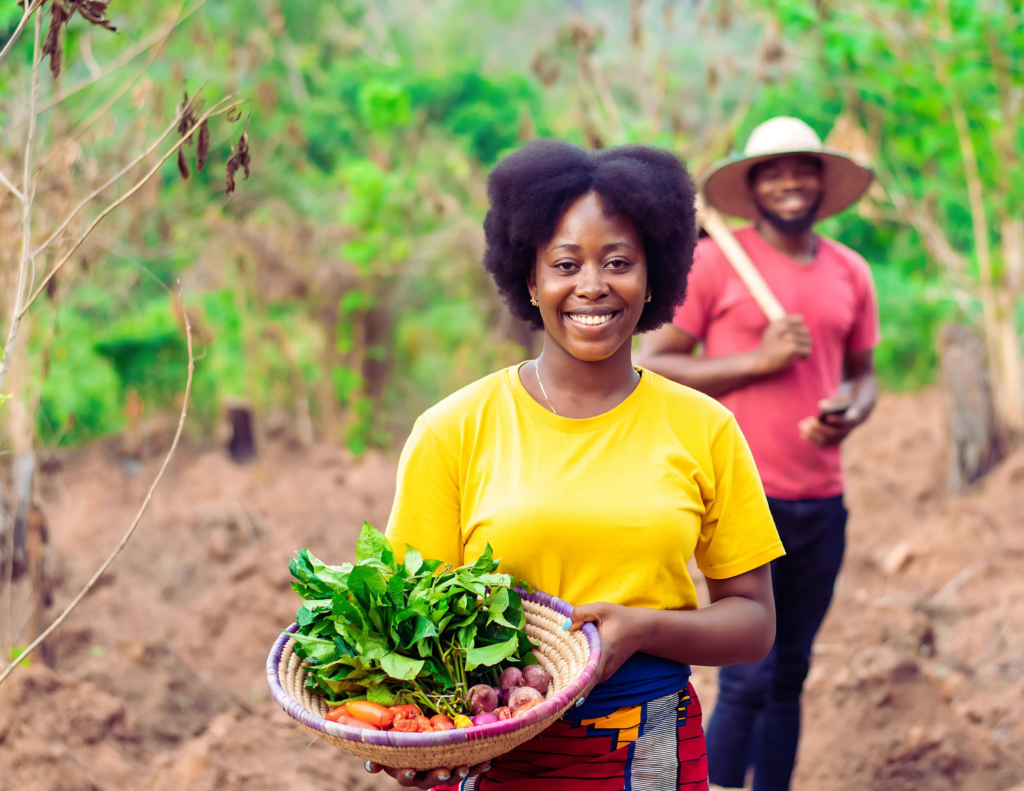
Road to Kampala – Advancing nutrition in Africa
The SDG2 Advocacy Hub, Zero Hunger Coalition, GAIN, Shamba Centre for Food and Climate and the Scaling Up Nutrition Movement will host the Road to Kampala, bringing together experts and stakeholders through a series of three subject-specific webinars, each tackling critical issues that align with the priorities of the new African agricultural framework. This first webinar will focus on the intersection of agriculture and nutrition, emphasising the need to strengthen food systems to deliver healthy diets and ensure better nutrition outcomes across the continent, with cross-cutting themes of gender and financing.
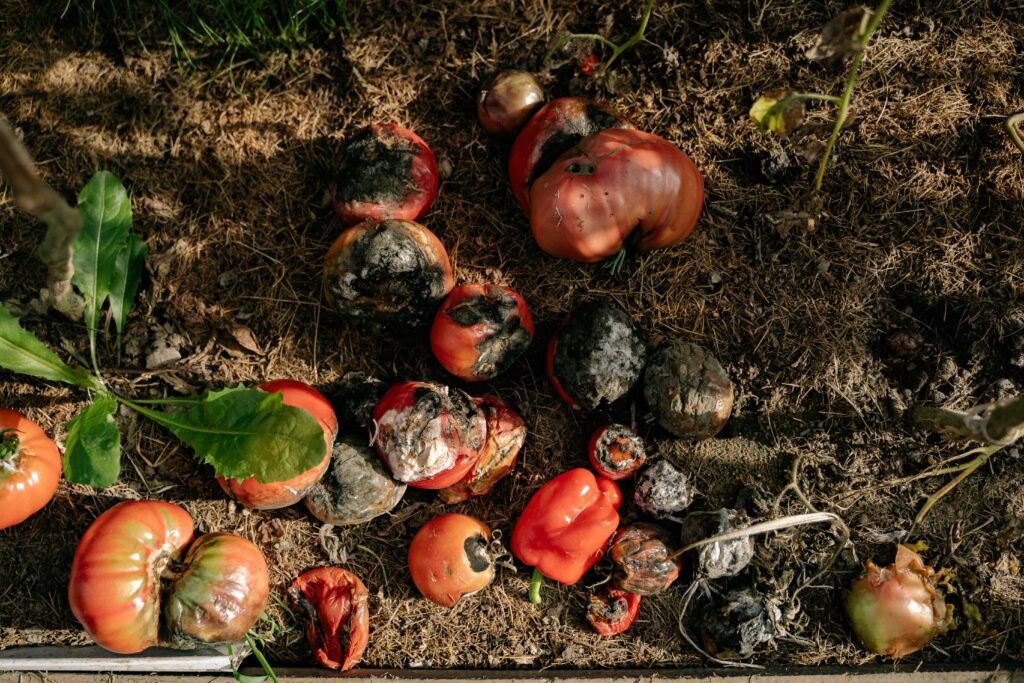
International Day of Awareness of Food Loss and Waste

NYC Goalkeepers Empty Plates Food Truck : Join us for a global wake-up call on hunger in New York
In collaboration with Goalkeepers, we are excited to bring Empty Plates to New York in September on the sidelines of the 79th UN General Assembly! A global movement organised through Hungry for Action, Empty Plates aims to increase awareness of the global food crisis, pressurize G20 leaders to action on a Global Plan to end the food crisis and drive engagement and participation through powerful campaigning activations around the world at key moments.
Already making waves in 2024 in London, Rio and Kigali, NYC offers a unique opportunity to engage with key stakeholders, decision makers, advocates and chefs, to urge leaders to take action on the global food crisis.
Timing:
September 22, 2-5pm
September 23, 11am-4pm
Join us to call for action!
On September 22-23:
- Take an empty plate and take a picture of yourself holding it.
- Post the picture on social media on September 23.
- Use the hashtags #emptyplates, #GoalKeepers2030, #UNGA79 and #G20.
- Tag @HungryforAct on X and @hungryforaction on Instagram.
The Global Alliance Against Hunger and Poverty
To accelerate progress towards SDG2, Hungry for Action has been calling for a global plan to drive collective action that would align policy priorities, improve coordination, reduce fragmentation, support country leadership and implementation capacity, mobilise adequate financing and promote greater accountability. A global plan would demonstrate much-needed political leadership to end the food crisis now and break the cycle of crises. This year, President Lula and Brazil’s presidency of the G20 have championed and announced a Global Alliance Against Hunger and Poverty, embodying the global plan’s key components. This is a necessary step to mobilize the global community around a joint agenda to end hunger and malnutrition in all its forms.
The SOFI report
The 2024 report, included a thematic focus on financing for SDG2, quantifying how much funding is needed to end food insecurity and all forms of malnutrition and identified innovative financing options to address the major drivers of food insecurity and malnutrition as well as transform food systems.
We applaud and celebrate Brazil’s leadership and call on other world leaders and the G20 governments to:
- Join the Alliance
- Work together on actioning a Global Plan
- Deliver the financing needed
Together, we can end the global food crisis, now and forever. To call for action from world leaders, sign this open letter.
Follow the campaign on X (formerly Twitter) and Instagram. Full assets and campaign messaging to include in social media posts are uploaded here.

Partnerships to Catalyze Action to End Hunger and Malnutrition
Join Partnerships to Catalyze Action to End Poverty, Hunger and Malnutrition, a side event hosted by World Vision International, the SDG2 Advocacy Hub, Hungry for Action, BRAC, Ação da Cidadania and the Government of Brazil.
With high-level speakers and representatives, the side event will spotlight the global food crisis and reflect on the impact of rising inequality, poverty, malnutrition and hunger on children and vulnerable groups while showcasing successful partnerships that unite stakeholders to tackle these critical challenges. The event calls on world leaders to endorse the Global Alliance Against Hunger and Poverty and mobilise the support of the international community.
RSVP here or tune into the livestream here.
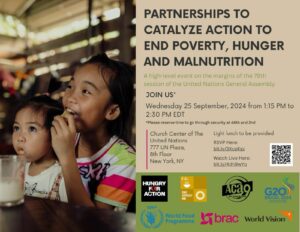
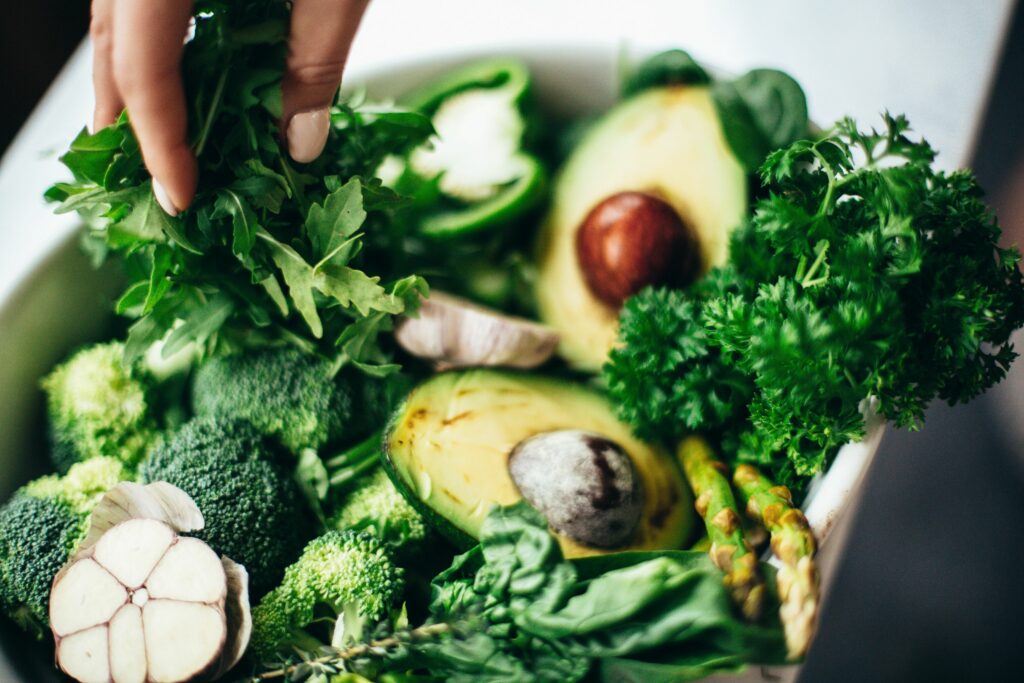
Healthy Plate – Healthy Planet
HEALTHY PLATE – HEALTHY PLANET – 2 October 2024 – Register now!
London
- Hosted By: Culinary Medicine UK
- Date & Time: Wednesday, 2nd October 2024, 6:00 PM – 9:00 PM
- Location: Westminster Kingsway College, Victoria Centre, London, SW1P 2PD
Join Culinary Medicine UK for a groundbreaking event that will help shape the future of the culinary industry.
Help to build a more sustainable food system with key stakeholders
This innovative event will bring together stakeholders from various industries and academia to elevate the conversation around the food and hospitality industries, as well as public sector catering services for healthcare, education institutions, care homes, prisons, and business catering.
Nutritional researchers from the Food and Mood Academy at Deakin University will share their latest research, alongside food industry guests who will present innovative ideas for healthy and sustainable food practices.
Together, we can work towards creating healthier plates that contribute to a healthier planet and improved public health. Register now and get ready to explore the connection between food, mood, and a healthier planet.
Culinary Medicine UK is a community interest company made up of a multi-professional team working across healthcare, culinary medicine and research with the aim of promoting “sustainable, affordable, equitable and healthy food for all”. Learn more about Culinary Medicine UK here.
Culinary Medicine UK are taking action in line with the Chefs’ Manifesto Action Plan, including Thematic Area 7: Education on food safety & healthy diets. To learn more about the connection between the Chefs’ Manifesto and Culinary Medicine, attend the event!

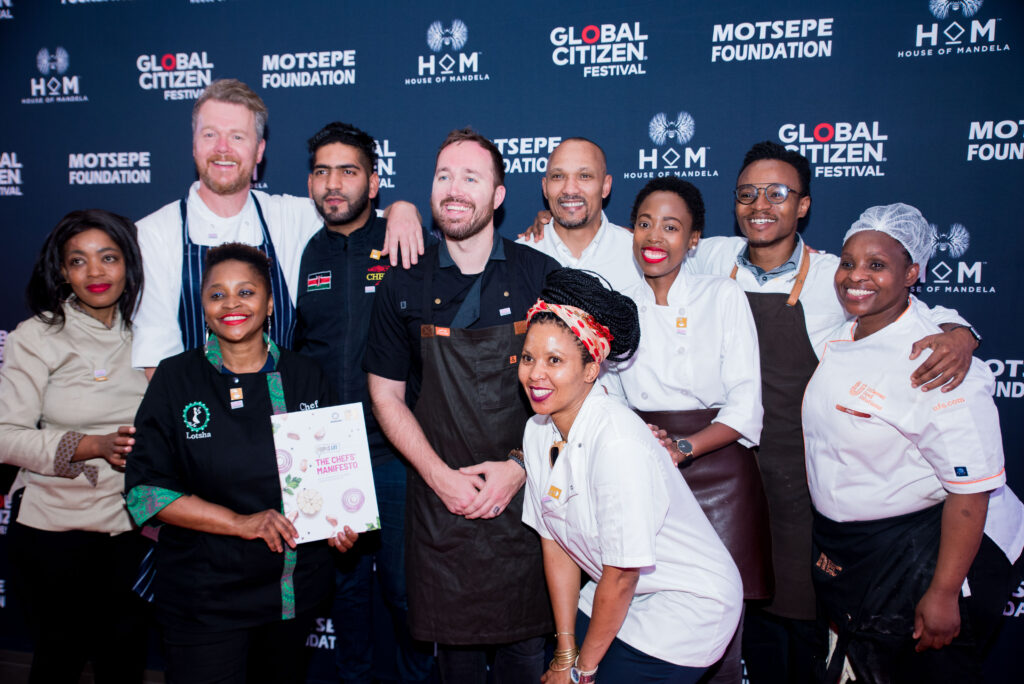
South Africa Chefs’ Manifesto Action Hub – Save the Date!
South Africa Chefs’ Manifesto Action Hub – 8 September 2024 – Save the Date!
Johannesburg
Hungry for change? Take action for a better food future at the South Africa Chefs’ Manifesto Action Hub on September 8th!
Chefs, researchers, educators, policymakers and food enthusiasts will come together for inspiring discussions, peer-to-peer learning, educational sessions, research insights, and more! All with the goal of driving action to transform food systems.
Register your interest to join the Chefs’ Manifesto with our partner, the Food Evolution Research Laboratory (FERL) School of Tourism & Hospitality in the College of Business and Economics at University of Johannesburg!
The Chefs’ Manifesto is a chef-led project that brings together 1500+ chefs from around the world to explore how they can help deliver a sustainable food system.
For event inquiries, please contact clare@sdg2advocacyhub.org.
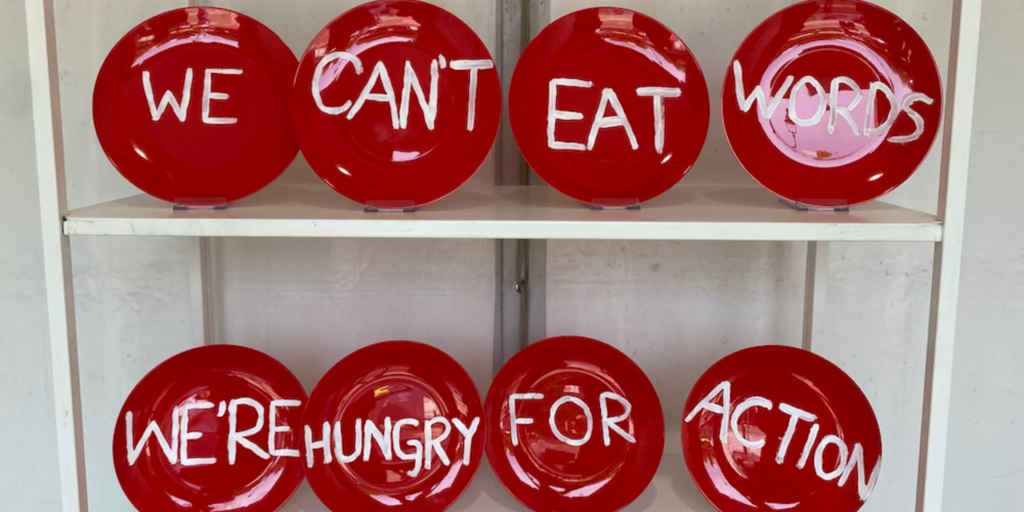
Empty Plates Campaign: Get ready for a global wake-up call on hunger
On Thursday, 25 July, Hungry for Action will activate the Empty Plates campaign in London and Rio de Janeiro. In London, prominent Chefs will serve approximately 750 empty plates – each plate representing 1 million people going hungry worldwide. They will be supported by advocates and numerous food champions, in person and remotely by others in various locations across the globe. The launch of the Empty Plates campaign will coincide with the announcement of the G20 Brazilian-led Global Alliance Against Hunger and Poverty and the launch of the highly anticipated United Nations annual State of Food Security and Nutrition in the World (SOFI) 2024 report that will update the latest data on hunger, food insecurity and malnutrition worldwide.
Hundreds of millions of people have nothing to put on their plates every day. They go to sleep hungry. It is outrageous and unacceptable that global hunger is rising in 2024 and that too many children are being robbed of their future potential due to malnutrition when we know many solutions exist; only concerted action from governments can fix it.
Join us to take action!
On the 25th of July:
- Take an empty plate and take a picture of yourself holding it.
- Post the picture on social media on 25th July.
- Use the hashtags #emptyplates and #G20.
- Tag @HungryforAct on X and @hungryforaction on Instagram.
The Global Alliance Against Hunger and Poverty
To accelerate progress towards SDG2, Hungry for Action has been calling for a global plan to drive collective action that would align policy priorities, improve coordination, reduce fragmentation, support country leadership and implementation capacity, mobilise adequate financing and promote greater accountability. A global plan would demonstrate much-needed political leadership to end the food crisis now and break the cycle of crises. This year, President Lula and Brazil’s presidency of the G20 have championed and plan to launch a Global Alliance Against Hunger and Poverty, embodying the global plan’s key components. This is a necessary step to mobilize the global community around a joint agenda to end hunger and malnutrition in all its forms.
The SOFI report
Since 1999, the SOFI reports have measured progress in reducing global hunger. In the last several years, they have documented a reversal in the trend due to conflict, climate change, economic shocks, including the impact of the COVID-19 pandemic, and persistent poverty and inequality. The world is not on track to achieve SDG2 by 2030, and urgent, coordinated action is required to address these multifaceted drivers of hunger and malnutrition.
The 2024 report, according to the UN, will include a thematic focus on financing for SDG2, quantifying how much funding is needed to end food insecurity and all forms of malnutrition and will identify innovative financing options to address the major drivers of food insecurity and malnutrition as well as transform food systems.
We applaud and celebrate Brazil’s leadership and call on other G20 governments to:
- Join the Alliance
- Work together on actioning a Global Plan
- Deliver the financing needed
Together, we can end the global food crisis, now and forever.
Follow the campaign on X (formerly Twitter) and Instagram. Full assets and campaign messaging to include in social media posts are uploaded here.
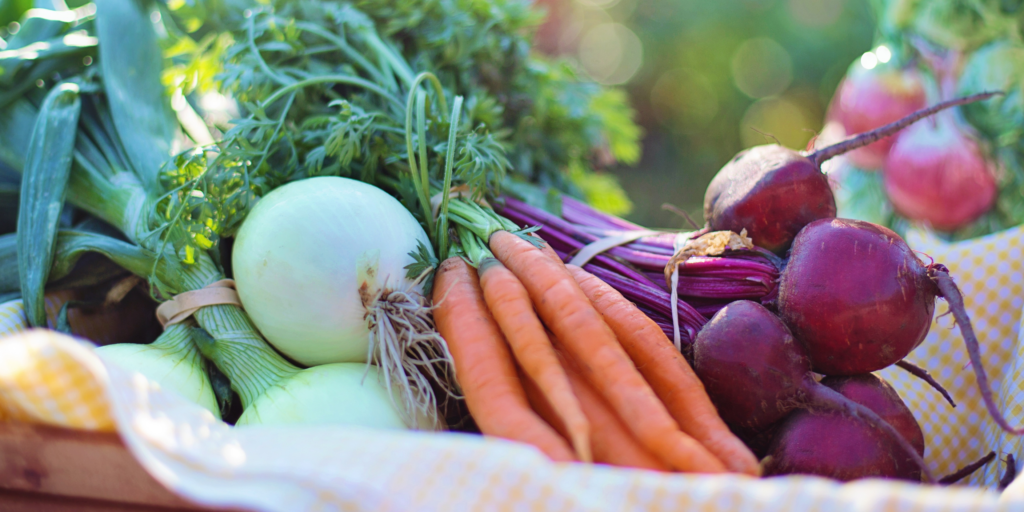
The State of Food Security and Nutrition in the World 2024: Special Event on Financing to End Hunger, Food Insecurity and Malnutrition in All its Forms

#beansonthemenu UK virtual launch webinar
On 3 June, 3pm, join us for the #beansonthemenu UK virtual launch. An “ask me anything” designed for chefs and other food service professionals, this webinar will provide further insights on how to participate, feature a few experts who will give brief insights into the benefits of beans – nutritional, environmental and affordability — and provide early examples about how to incorporate beans to your menu.
Featured speakers:
Tim Spector
Chef Sohini Banjeree (Smoke and Lime)
Chef Bettina Campolucci Bordi (Bettina’s Kitchen)
Josiah Meldrum (Hodmedod Ltd)
Amelia Christie-Miller (Bold Bean Co.)
Dr Caspar Chater (Royal Botanic Gardens, Kew)
Elphee Medici (Expert Nutrition and Sustainable Diets Consultant)
Visit http://www.beansonthemenu.com/ to learn more
